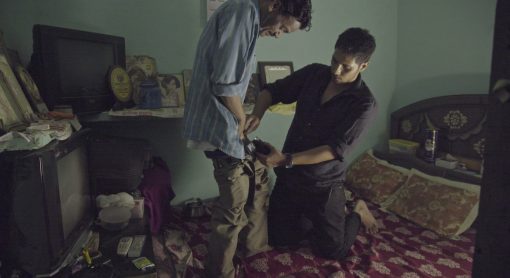
Argentine filmmaker Lucrecia Martel remarked, “One must never assume that cinema pursues the truth, for there is nothing more boring than the pursuit of truth,” and Mehsampur is anything but boring.
Aiming to document Punjabi folk singer Amar Singh Chamkila’s assassination, the story of a film within a film, Mehsampur is a fiction, a meta-fiction, a documentary and a biopic all at once – yet sometimes it seems it is none of them. Director Kabir Chaudhary’s “Devrath” is anything but a sensitive and empathetic documentary filmmaker. His hand-held camera continually blurs the boundary between the real and the fictional and confuses the spectator about spectatorship itself so that they are unable to decide who is watching whom. These moments that push the viewer’s idea of reality, rendering it confusing and doubtful, inform the rhythm of Mehsampur. And, in doing so, opens up the possibility of new and unique direction in Indian filmmaking.
Mehsampur is a self-reflexive performance in what seems like an indulgent filmmaking, and that is its greatest strength. Chamkila’s former manager, Kesar Singh Tikki, former singing partner Surinder Sonia, and dholak player Lal Chand together participate in documentary filmmaker Devrath’s (played by Devrath Joshi) charades. In the film, Devrath is a documentary filmmaker from Bombay, aching with pangs of creative genius to tell the tale of he-who-must-not-be-named, in a manner never-seen-before! His illusions of creating pioneering work on Chamkila’s life are shattered in the film itself, when he learns of a big and fancy film crew, making a bigger film on Chamkila, and selling/offering the actors the biggest Bombay dreams and exposure in exchange. The late singer, Chamkila, though, is nothing more than a spectre in the film – we don’t see him, we just know he exists. His music forms the background score in some scenes with characters speaking over him.
Nandini Ramnath writes, “Mehsampur is both a location on the map and in the imagination of the filmmaker.” Absurdist and anarchist, the film throws the script out of the window, both literally (by Manjot in the film) and metaphorically when “real” people dress up as actors to enact the “real” sequence of Chamkila’s assassination. In another tragic-comic sequence, Devrath makes Tikki recreate over and over again a drunken attack on Chamkila’s office in 1987 till it looks “real” enough to fool the viewer.
The objective distance between the subject and the filmmaker in a documentary; the ethics of working with real people/subjects; the lines between truth and artifice are totally disrupted in Mehsampur as it throws the documentary filmmaker off the pedestal. Devrath is shown bribing his subjects with money and alcohol, even holding Manjot (Navjot Randhawa, a real actor playing Chamkila’s co-singer and second wife, Amarjot in Devrath’s palace of illusions) hostage to get the footage he wants. To top this, a whole new film begins immediately after the footage is stolen. And in that space, director Kabir Chaudhary freewheels about everything except Chamkila. A film that showcases a singer in every house, cars with Babbu Mann stickers, a bar singer that adds “Hai Shava!” to a Britney classic, and a characteristic rural Punjabi dialect, director Kabir’s Chaudhary’s nuances present a Ludhiana that is even more Ludhiana-like than the real one.
In what seems like a rather dissonant scene in the film, Manjot quotes Proust on the “secret to eternal youth” possessing the “power to behold the universe from another’s eyes” and this forms the essence of Mehsampur, a film in pursuit of capturing, through the words and eyes of another, the ghosts of Baisakhi’s past!
Mehsampur won the Golden Gateway Award at MAMI Film Festival 2018.
Watch the trailer of the film here.
Read more:
Devi and Other ‘Kalis’
“In a choice between the beautiful and the ugly, the film always chooses the ugly”
Jonaki: Part Dream, Part Waking




